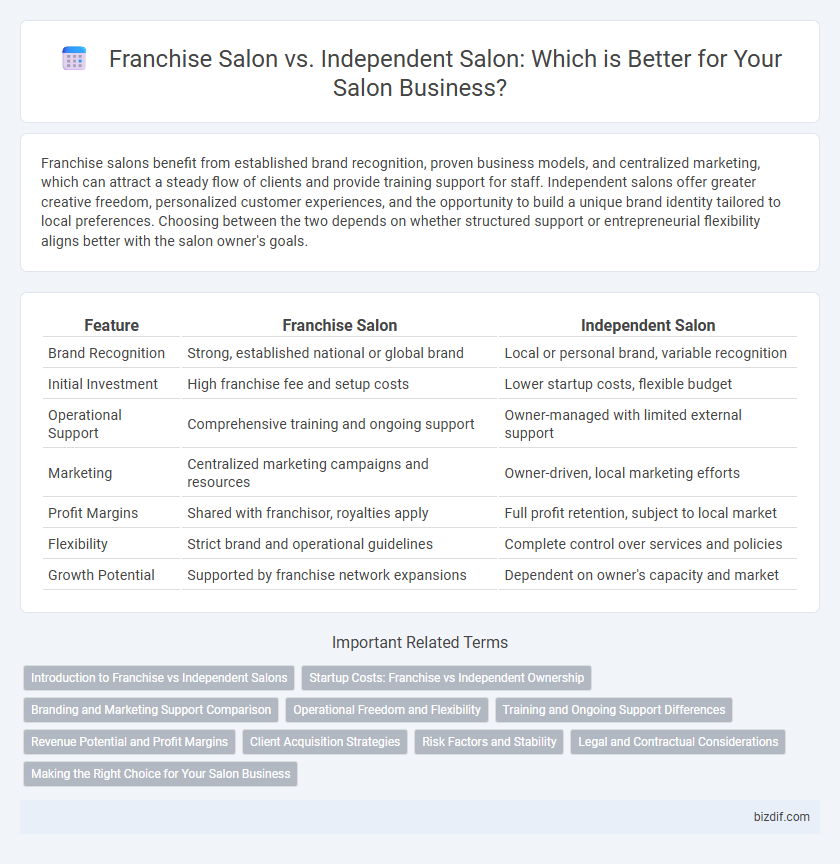Franchise salons benefit from established brand recognition, proven business models, and centralized marketing, which can attract a steady flow of clients and provide training support for staff. Independent salons offer greater creative freedom, personalized customer experiences, and the opportunity to build a unique brand identity tailored to local preferences. Choosing between the two depends on whether structured support or entrepreneurial flexibility aligns better with the salon owner's goals.
Table of Comparison
| Feature | Franchise Salon | Independent Salon |
|---|---|---|
| Brand Recognition | Strong, established national or global brand | Local or personal brand, variable recognition |
| Initial Investment | High franchise fee and setup costs | Lower startup costs, flexible budget |
| Operational Support | Comprehensive training and ongoing support | Owner-managed with limited external support |
| Marketing | Centralized marketing campaigns and resources | Owner-driven, local marketing efforts |
| Profit Margins | Shared with franchisor, royalties apply | Full profit retention, subject to local market |
| Flexibility | Strict brand and operational guidelines | Complete control over services and policies |
| Growth Potential | Supported by franchise network expansions | Dependent on owner's capacity and market |
Introduction to Franchise vs Independent Salons
Franchise salons operate under a recognized brand with standardized services, marketing, and training protocols, ensuring consistency and leveraging established customer trust. Independent salons offer personalized, unique experiences tailored by individual stylists or owners, allowing greater creative freedom and flexibility in service offerings. Choosing between franchise and independent salons depends on preferences for brand reliability versus customized, local charm.
Startup Costs: Franchise vs Independent Ownership
Franchise salons typically require higher startup costs, including franchise fees, royalty payments, and mandatory marketing contributions, which can range from $100,000 to $300,000 or more depending on the brand. Independent salons offer lower initial investment flexibility, often starting under $50,000, but owners must cover all expenses such as branding, marketing, and equipment without corporate support. Choosing between franchise and independent ownership impacts financial planning, with franchises providing established brand recognition and systems at a higher cost, while independents offer greater creative control and potentially lower initial investment.
Branding and Marketing Support Comparison
Franchise salons benefit from established branding and comprehensive marketing support, including national advertising campaigns, recognized logos, and proven promotional strategies that drive consistent customer traffic. Independent salons rely heavily on personalized, localized branding efforts and grassroots marketing tactics, offering flexibility but requiring significant time and expertise to build brand recognition. Franchise models provide scalable marketing resources and ongoing brand management, whereas independent salons must invest independently in digital marketing, social media presence, and client outreach to cultivate a loyal customer base.
Operational Freedom and Flexibility
Franchise salons offer structured operational frameworks with standardized procedures, limiting flexibility but ensuring brand consistency and support. Independent salons provide greater operational freedom, allowing owners to customize services, pricing, and scheduling to adapt quickly to market trends. This flexibility often leads to innovative client experiences but requires stronger self-management and marketing efforts.
Training and Ongoing Support Differences
Franchise salons offer comprehensive training programs and continuous ongoing support, including standardized techniques and marketing strategies provided by the parent brand. Independent salons typically design their own training methods, which may lack consistency but allow for personalized skill development tailored to the owner's vision. Ongoing support in independent salons often depends on local networks or industry associations rather than structured franchise systems.
Revenue Potential and Profit Margins
Franchise salons benefit from established brand recognition and centralized marketing, often leading to higher initial customer flow and more predictable revenue streams compared to independent salons. However, franchise owners typically face royalty fees and stringent operational guidelines, which can compress profit margins. Independent salons enjoy greater control over pricing and service innovation, potentially yielding higher profit margins if managed efficiently despite the challenges of building a customer base from scratch.
Client Acquisition Strategies
Franchise salons benefit from extensive brand recognition and centralized marketing campaigns, enabling rapid client acquisition through loyalty programs and nationwide promotions. Independent salons leverage personalized customer experiences and local community engagement to attract and retain clients, often using targeted social media marketing and referral incentives. Both models employ digital booking systems and reputation management tools to optimize client outreach and retention.
Risk Factors and Stability
Franchise salons benefit from established brand recognition and proven business models, reducing financial risks and providing greater operational stability. Independent salons face higher risks due to market uncertainty, reliance on local reputation, and fluctuating client retention but offer flexibility and creative control. Stability in franchise salons often comes from corporate support and standardized training, whereas independent salons must navigate market volatility and evolving trends independently.
Legal and Contractual Considerations
Franchise salons operate under legally binding agreements that require adherence to brand standards, royalty payments, and specific operational guidelines, ensuring consistent service quality and marketing support. Independent salons enjoy greater contractual freedom but assume full responsibility for compliance with local business regulations, licensing, and liability management. Understanding the distinct legal frameworks is essential for salon owners to mitigate risks and protect their business interests.
Making the Right Choice for Your Salon Business
Choosing between a franchise salon and an independent salon depends on factors like brand recognition, operational support, and profit margins. Franchise salons offer established marketing strategies and training programs, reducing startup risks, while independent salons provide greater creative control and flexibility in service offerings. Evaluating market demand, target demographics, and initial investment helps salon owners make informed decisions that align with their long-term business goals.
Franchise salon vs Independent salon Infographic

 bizdif.com
bizdif.com